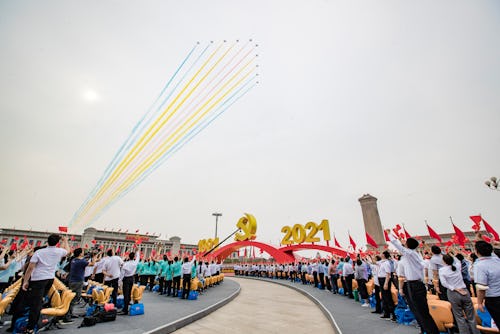The Chinese government apparently changed the weather
To secure blue skies for a government celebration, the Chinese Communist Party juiced the clouds, according to a team of scientists.

We already know that humans are at least indirectly responsible for affecting the weather, pumping greenhouse gases into the atmosphere and warming the planet. But China has taken it even further. According to a study conducted by scientists at Tsinghua University in Beijing, the Chinese government successfully managed to temporarily eliminate air pollution to create blue skies on the day that the Chinese Communist party celebrated its 100th anniversary.
On July 1, an estimated 70,000 people attended a ceremony in Tiananmen Square that was headlined by an airshow that showed off some of China’s latest military technology, including jets and helicopters flying in a “100” formation to celebrate the event. The government was allegedly concerned that air pollution and overcast skies would distract from the spectacle. To clear the skies, the government reportedly launched a cloud-seeding operation, a controversial and barely studied technology that can modify the weather.
Cloud-seeding is the process of adding chemicals to the air in order to artificially increase the odds of precipitation. Releasing particles of silver iodide in the sky causes water droplets to cluster together around the chemical, forming clouds that can result in rain or snowfall depending on the conditions.
While China has not admitted to launching a cloud-seeding campaign, there’s a fair amount of evidence to suggest that they went for it. The government was absolutely worried about air pollution in the lead-up to the event, forcing factories and other pollution-producing operations in Beijing to temporarily shut down operations in order to cut back on the clouded air quality, according to The Guardian. Some residents in the mountain regions near the city reportedly saw rockets launched in the hours before the political celebration, which researchers believe contained silver iodide.
The results were as the government intended, it seems. The Tsinghua University study, published in the journal Environmental Science, found that the cloud-seeding effort managed to reduce the level of air pollutants by more than two-thirds, improving the air quality from “moderate” to “good.” The skies cleared up, and the rainfall managed to hold in the sky during the event. According to the South China Morning Post, a downpour occurred shortly after the celebration concluded.
While much of the world has taken a cautious approach to the idea of cloud-seeding, with many worrying about the unintended consequences that modifying the weather may bring, China has pushed ahead with the controversial practice. The country has reportedly spent more than $1 billion studying the technology and is planning widespread experimentation with it, using it to try to disrupt hail storms and increase rainfall in agricultural regions.
While there is some limited evidence to suggest that cloud-seeding performed in moderation can have benefits, there are still lots of questions that need to be answered. Some research has found that silver iodide can be toxic to fish, livestock, and humans. Other studies have warned about the possibility that unregulated use of the technology could result in flooding and other dangerous outcomes.
Weather modification is increasingly on the minds of governments around the world as a potential solution to the outlier weather conditions that climate change brings. While it might have some purpose in limited use, anything beyond that is an attempt to take a shortcut, to avoid doing the real work of reducing carbon emissions to combat global warming.